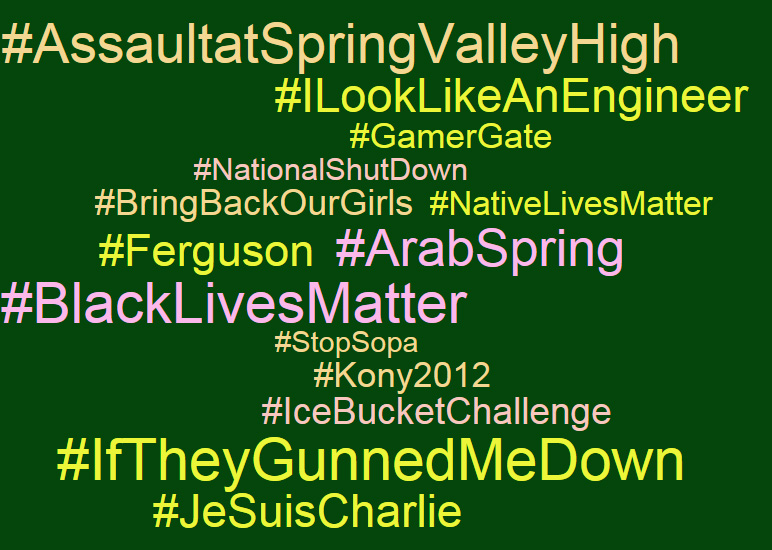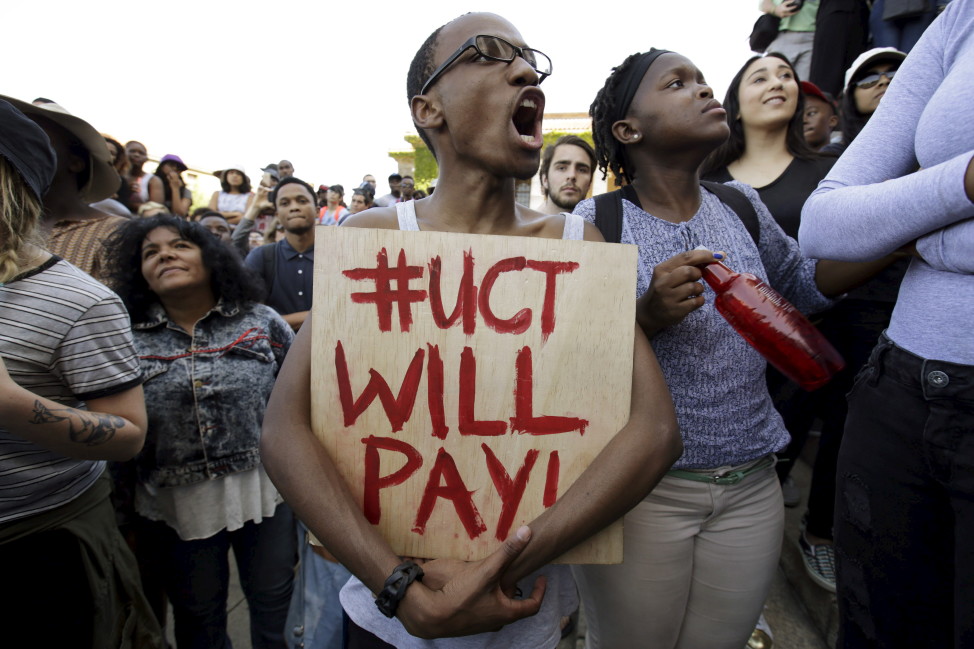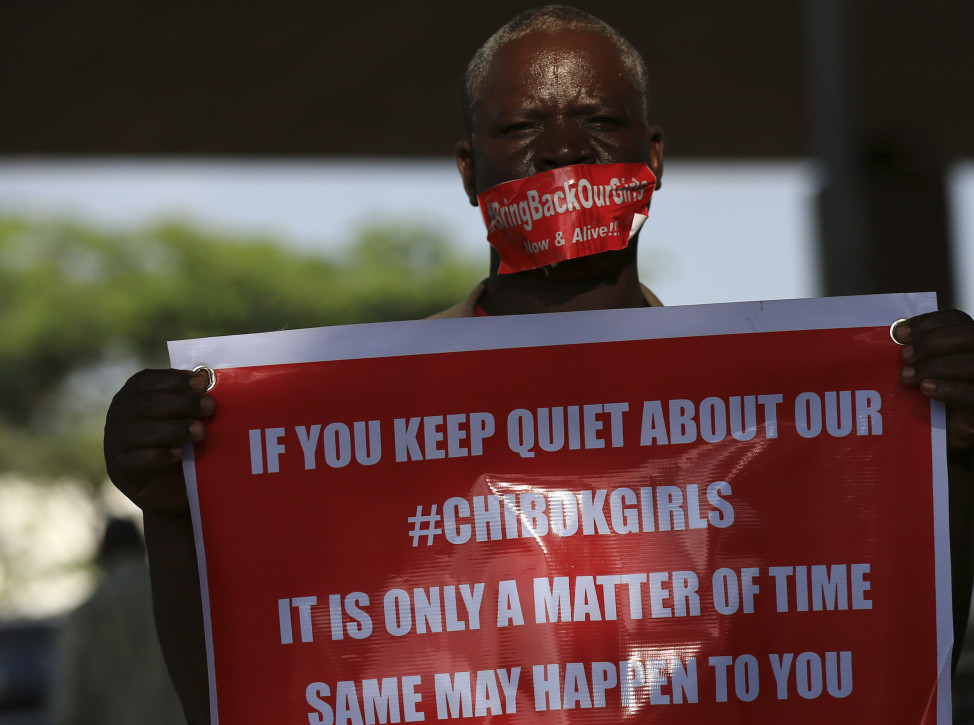
You might not give much thought to the hashtag – that little # symbol you sprinkle between your daily tweets and online messages. But what started as a tool to classify topics and relevant conversations has now become a rallying cry for sociopolitical action.
“We look at the hashtag as kind of a symbol that lets people get behind it as opposed to just kind of throwing their opinions out there, and they’re part of a larger conversation,” said Tim Receveur, Director of PeaceTech Exchanges at the United States Institute of Peace. ” … There’s a symbol of empowerment around the hashtag”
Tech expert Chris Messina is credited with creating the first Twitter hashtag in August 2007. The whole thing started with this tweet:
how do you feel about using # (pound) for groups. As in #barcamp [msg]?
— ⚒ Chris Messina ⚔ (@chrismessina) August 23, 2007
Since then, the hashtag has become more universal, morphing into something its originator did not expect, said Receveur. “It’s kind of taken off. And you’re starting to see a …. movement taking off around hashtags, some successful, some not.”
“Hashtags have definitely become a modern-day tool for social movements. People use them to mobilize and to connect with other activists,” said sociologist Peter Kaufman of the State University of New York at New Paltz. “Because they are used on social media and have the potential to go viral, they can also bring rapid awareness to an issue across borders.”

Students protest rising tuition fees during a mass demonstration at the University of Cape Town, South Africa, Oct. 22, 2015. President Jacob Zuma said he will meet student leaders and university authorities on Friday to discuss planned hikes in tuition fees that have sparked a week of nationwide protests, some of which have turned violent. (Reuters)
Some hashtags, like the #IceBucketChallenge, which raises awareness and money for Lou Gehrig’s Disease, serve a single purpose. Others, like #BlackLivesMatter, are reused for related events. South Africa’s #NationalShutDown and #FeesMustFall started as a push to curb rising university fees and has since become a reflection of ongoing student protests in the country.
“There are some that we see like the #BlackLivesMatter one, where it was bringing attention to Trayvon Martin a couple of years ago,” said Receveur. “And then it’s kind of a movement. And that’s reused for Michael Brown and used to draw attention.”
“#BlackLivesMatter or #BringOurGirlsBack are just two recent examples that have been used by activists to raise awareness of a social problem and get other individuals committed to the cause,” said Kaufman in an email. “The internet and social media are valuable tools for social movements and the use of hashtags is just one example of how this technology is reshaping the face of activism in the 21st Century.”

A member of Nigeria’s #BringBackOurGirls campaign group holds a placard featuring another related hashtag on the 140th day of the abduction of 219 schoolgirls from Government Secondary School in Chibok, Borno State. The girls were abducted while they were sitting for their final exams, Abuja, Sept. 1, 2014. (Reuters)
#BringBackOurGirls
On the night of April 14, 2014, Boko Haram terrorists abducted 276 school girls in Borno State’s Chibok Community. When the news broke the following morning, Nigerians took to social media.
“Immediately there were responses online, especially on social media,” said Sesugh Akume, Head of Strategic Communications with #BringBackOurGirls in an email.
After April 23 and several related hashtags, #BringBackOurGirls was adopted as a uniform hashtag. Akume said adopting a single hashtag backed by offline activities made it “easier to keep the cause focused under one theme.”
#BringBackOurGirls came at a time when Nigeria “desperately needed a platform to reach out to the world and solicit for assistance to a cause that borders on the circumference of humanity,” said Jeff Okoroafor, a strategic team member with #BringBackOurGirls in an email.
“Every second, minute and hour of the time,” he said, “people from within and outside the country were tweeting and facebooking about it, calling for decisive action.”
What was a LONE voice transformed into a PEOPLE’S voice, a GLOBAL voice. And so the wildfire spread, dragging everything and everyone along with it. The #BringBackOurGirls started as a hashtag but today it’s a MOVEMENT with a singularity of purpose – the abducted girls.
A chronicler of history
Hashtags made it possible for people to witness momentous events like the Middle East’s 2010 Arab Spring revolution as they unfolded. For Receveur, the #ArabSpring hashtag offered a sort of chronicle that gave him insight into developments long before turmoil began on the ground.
“They went from discussion on rents going up and food to – like a year later, turning into ‘we want to overthrow the government, we want political change’ – and so kind of seeing the discussions change and the topics change over the year that led to that.”
Now, some South Africans wonder if their country is witnessing similar transformative events:
Is this South Africa’s #ArabSpring? South African Youth take #FeesMustFall to the steps of #Parliament. South African Youth have Spoken.
— Thabiso Sithole (@ThabisoSithole) October 21, 2015
Receveur acknowledged that there are skeptics who question the usefulness of the hashtag. But he believes that there have been “enough cases where it has accomplished what it set out to do.” He cited the #IceBucketChallenge as an example of a hashtag that has “shown that it can change a mindset, could raise lots of money with a simple hashtag.”
This is the kind of impact he expects to see as millions of unconnected people come online in the next five or six years.
“And kind of like … with [the] Arab Spring, this social political activism is going to really take off,” he said. “But it’s going to give people a chance to connect also and tell their stories.”
As the hashtag comes into its own and becomes more than just a one-time label, Receveur projected that “we’re going to go from this lazy generation of just liking something to actually getting behind it and having more of an impact and kind of empowering people with technology.”

2 responses to “The Little #Hashtag That Changed the World”
[…] NotInMyName and its offshoot, along with hashtags such as PeaceForParis illustrate how an effective tag serves as “a modern-day tool for social movements,” Peter Kaufman told VOA’s Techtonics blog. […]
[…] NotInMyName and its offshoot, along with hashtags such as PeaceForParis illustrate how an effective tag serves as "a modern-day tool for social movements," Peter Kaufman told VOA’s Techtonics blog. […]